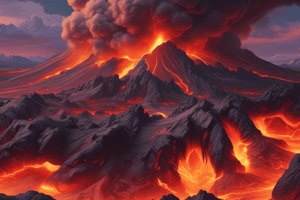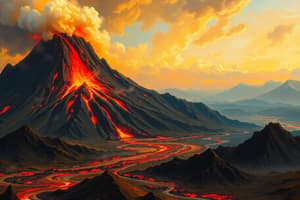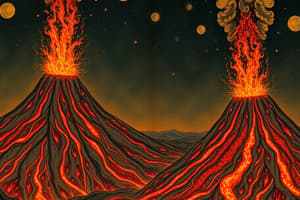Podcast
Questions and Answers
What is the highest point of a volcano where you can find an opening called a vent?
What is the highest point of a volcano where you can find an opening called a vent?
- Slopes
- Base
- Main Vent
- Summit (correct)
Where is the region beneath the vent of a volcano where molten rock is stored before eruption?
Where is the region beneath the vent of a volcano where molten rock is stored before eruption?
- Magma Chamber (correct)
- Summit
- Conduit
- Main Vent
Which part of a volcano is described as the sides or flanks that radiate from the main vent?
Which part of a volcano is described as the sides or flanks that radiate from the main vent?
- Base
- Summit
- Conduit
- Slopes (correct)
What connects the magma chamber to the crater in a volcano?
What connects the magma chamber to the crater in a volcano?
Which part of a volcano emits lava, gases, ash, or other volcanic materials?
Which part of a volcano emits lava, gases, ash, or other volcanic materials?
What do we call any movement of magma towards or onto the surface in a volcano?
What do we call any movement of magma towards or onto the surface in a volcano?
What is the funnel-shaped or bowl-shaped hollow at the top of a volcano called?
What is the funnel-shaped or bowl-shaped hollow at the top of a volcano called?
What is molten rock that is expelled onto the Earth's surface during a volcanic eruption called?
What is molten rock that is expelled onto the Earth's surface during a volcanic eruption called?
Which type of volcano is built from particles and blobs of solidified lava ejected from a single vent?
Which type of volcano is built from particles and blobs of solidified lava ejected from a single vent?
What is the primary feature that distinguishes composite volcanoes from other types?
What is the primary feature that distinguishes composite volcanoes from other types?
Which type of volcano is built almost entirely of fluid lava flows and has a broad, flat shape?
Which type of volcano is built almost entirely of fluid lava flows and has a broad, flat shape?
What makes shield volcanoes relatively safe compared to other types of volcanoes?
What makes shield volcanoes relatively safe compared to other types of volcanoes?
Flashcards
Volcano Summit
Volcano Summit
The highest point of a volcano, featuring an opening called a vent.
Magma Chamber
Magma Chamber
The underground region beneath a volcano's vent where molten rock accumulates.
Volcano Slopes
Volcano Slopes
The sides of a volcano that extend outward from the main vent.
Volcano Conduit
Volcano Conduit
Signup and view all the flashcards
Main Vent
Main Vent
Signup and view all the flashcards
Volcanism
Volcanism
Signup and view all the flashcards
Volcano Crater
Volcano Crater
Signup and view all the flashcards
Lava
Lava
Signup and view all the flashcards
Cinder Cone Volcano
Cinder Cone Volcano
Signup and view all the flashcards
Composite Volcano
Composite Volcano
Signup and view all the flashcards
Shield Volcano
Shield Volcano
Signup and view all the flashcards
Shield Volcano Safety
Shield Volcano Safety
Signup and view all the flashcards
Study Notes
Volcano Anatomy and Features
- The highest point of a volcano containing an opening is called the vent.
- The region beneath the vent, where molten rock is stored before an eruption, is known as the magma chamber.
- The sides or flanks of a volcano that radiate from the main vent are referred to as the volcanic slopes.
- A conduit connects the magma chamber to the crater of a volcano.
- The part of a volcano that emits lava, gases, ash, and other volcanic materials is the vent opening.
- Any movement of magma towards or onto the surface of a volcano is termed magma ascent.
- The funnel-shaped or bowl-shaped hollow at the top of a volcano is known as a crater.
- Lava is the molten rock expelled onto the Earth's surface during a volcanic eruption.
Types of Volcanoes
- A cinder cone volcano is built from particles and blobs of solidified lava ejected from a single vent.
- The primary feature distinguishing composite volcanoes is their alternating layers of lava flow and volcanic ash, leading to a more stratified structure.
- Shield volcanoes are characterized by being built almost entirely of fluid lava flows, resulting in a broad, flat shape.
- Shield volcanoes are relatively safe because they tend to produce less explosive eruptions, allowing lava to flow gently rather than violently.
Studying That Suits You
Use AI to generate personalized quizzes and flashcards to suit your learning preferences.




